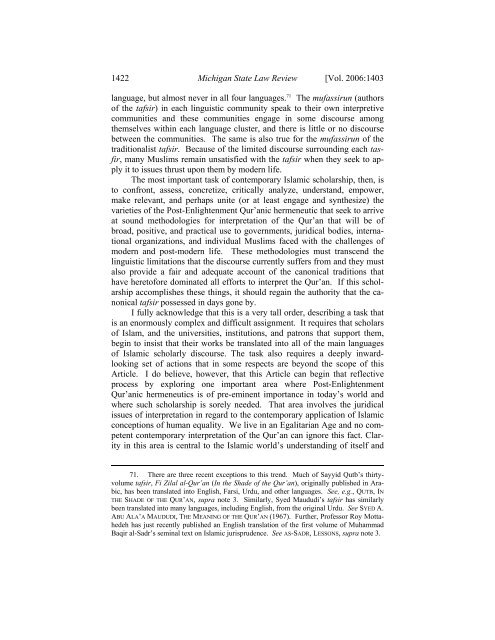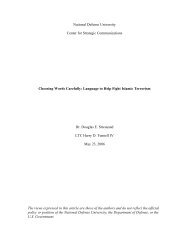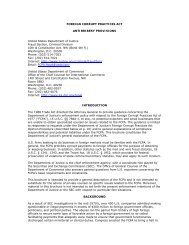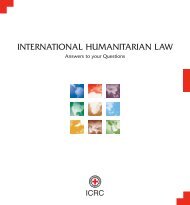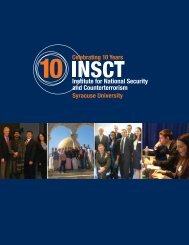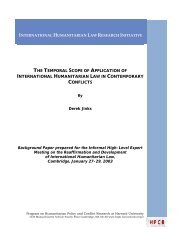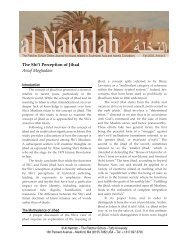some reflection on post-enlightenment qur'anic hermeneutics
some reflection on post-enlightenment qur'anic hermeneutics
some reflection on post-enlightenment qur'anic hermeneutics
You also want an ePaper? Increase the reach of your titles
YUMPU automatically turns print PDFs into web optimized ePapers that Google loves.
1422 Michigan State Law Review [Vol. 2006:1403language, but almost never in all four languages. 71 The mufassirun (authorsof the tafsir) in each linguistic community speak to their own interpretivecommunities and these communities engage in <str<strong>on</strong>g>some</str<strong>on</strong>g> discourse am<strong>on</strong>gthemselves within each language cluster, and there is little or no discoursebetween the communities. The same is also true for the mufassirun of thetraditi<strong>on</strong>alist tafsir. Because of the limited discourse surrounding each tasfir,many Muslims remain unsatisfied with the tafsir when they seek to applyit to issues thrust up<strong>on</strong> them by modern life.The most important task of c<strong>on</strong>temporary Islamic scholarship, then, isto c<strong>on</strong>fr<strong>on</strong>t, assess, c<strong>on</strong>cretize, critically analyze, understand, empower,make relevant, and perhaps unite (or at least engage and synthesize) thevarieties of the Post-Enlightenment Qur’anic hermeneutic that seek to arriveat sound methodologies for interpretati<strong>on</strong> of the Qur’an that will be ofbroad, positive, and practical use to governments, juridical bodies, internati<strong>on</strong>alorganizati<strong>on</strong>s, and individual Muslims faced with the challenges ofmodern and <strong>post</strong>-modern life. These methodologies must transcend thelinguistic limitati<strong>on</strong>s that the discourse currently suffers from and they mustalso provide a fair and adequate account of the can<strong>on</strong>ical traditi<strong>on</strong>s thathave heretofore dominated all efforts to interpret the Qur’an. If this scholarshipaccomplishes these things, it should regain the authority that the can<strong>on</strong>icaltafsir possessed in days g<strong>on</strong>e by.I fully acknowledge that this is a very tall order, describing a task thatis an enormously complex and difficult assignment. It requires that scholarsof Islam, and the universities, instituti<strong>on</strong>s, and patr<strong>on</strong>s that support them,begin to insist that their works be translated into all of the main languagesof Islamic scholarly discourse. The task also requires a deeply inwardlookingset of acti<strong>on</strong>s that in <str<strong>on</strong>g>some</str<strong>on</strong>g> respects are bey<strong>on</strong>d the scope of thisArticle. I do believe, however, that this Article can begin that reflectiveprocess by exploring <strong>on</strong>e important area where Post-EnlightenmentQur’anic <strong>hermeneutics</strong> is of pre-eminent importance in today’s world andwhere such scholarship is sorely needed. That area involves the juridicalissues of interpretati<strong>on</strong> in regard to the c<strong>on</strong>temporary applicati<strong>on</strong> of Islamicc<strong>on</strong>cepti<strong>on</strong>s of human equality. We live in an Egalitarian Age and no competentc<strong>on</strong>temporary interpretati<strong>on</strong> of the Qur’an can ignore this fact. Clarityin this area is central to the Islamic world’s understanding of itself and71. There are three recent excepti<strong>on</strong>s to this trend. Much of Sayyid Qutb’s thirtyvolumetafsir, Fi Zilal al-Qur’an (In the Shade of the Qur’an), originally published in Arabic,has been translated into English, Farsi, Urdu, and other languages. See, e.g., QUTB, INTHE SHADE OF THE QUR’AN, supra note 3. Similarly, Syed Maududi’s tafsir has similarlybeen translated into many languages, including English, from the original Urdu. See SYED A.ABU ALA’A MAUDUDI, THE MEANING OF THE QUR’AN (1967). Further, Professor Roy Mottahedehhas just recently published an English translati<strong>on</strong> of the first volume of MuhammadBaqir al-Sadr’s seminal text <strong>on</strong> Islamic jurisprudence. See AS-SADR, LESSONS, supra note 3.


